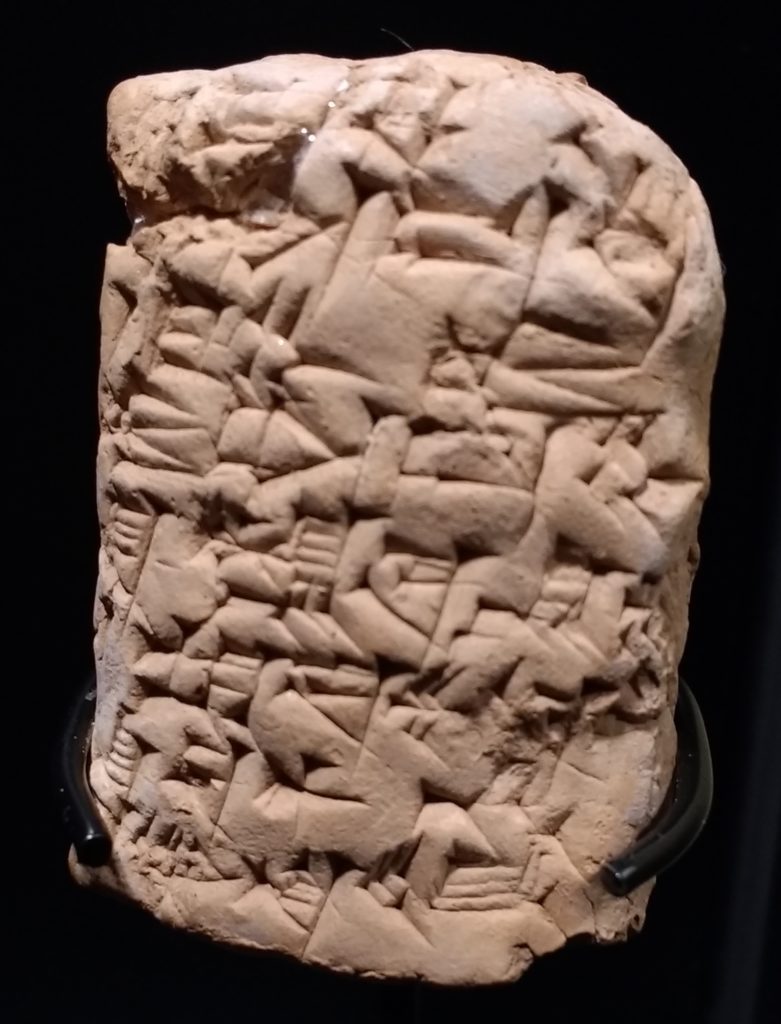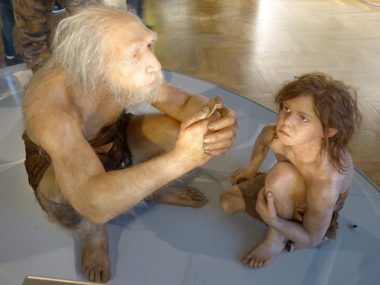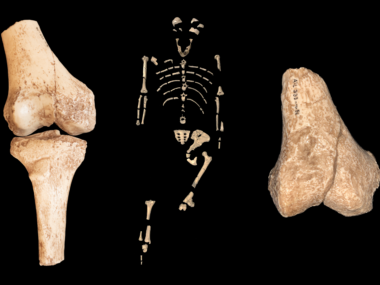
The existence of humans suggests that, at some point, there must have been a first human. Neither evolutionists nor creationists deny this. However, creationists believe that Adam (Genesis 1–2) was the first human. But whether the first human was Adam or some unnamed, recently-evolved person, where did that person learn to speak?
Evidence suggests that humans do not learn to speak unless they are taught by someone who already knows how to speak. Additionally, the archaeological record indicates that fully-developed languages have been in existence as long as humans have been.1 For these reasons, Curtis, in a 1990 article, argues that a personal creator was responsible for the existence of the first human.2
The following article is a summary of “Human Language Demands a Creator“ by William M. Curtis, and of the surrounding discussion and research pertaining to it. The views expressed do not necessarily reflect those of New Creation.
Linguistic Evidence
Linguistic research suggests that languages have not evolved from a prehistoric development period.3 Rather, languages have always existed with the same communication potential as they currently possess. In fact, it is possible that they even held greater communication potential in the past.

Archaeological Evidence
The archaeological finds from the past 100 years of excavations have demonstrated that written language appears well developed in the earliest records of civilization. For example, the Ebla tablets date to about 2000 BC. These tablets contain writing in a fully-developed, phonetic language.
How Do People Learn How to Speak?
Some Darwinian anthropologists have suggested that if, in the process of evolution, there was a transition from animal to man, this transition would have included the acquisition of language. However, one of these anthropologists, Humbolt, realized that man cannot speak without already being human. For him, this created an unsolvable problem regarding the origin of speech.4

Another problem with determining the origin of speech from an evolutionary perspective is that in so-called primitive cultures, the languages tend to be more complex than in more advanced cultures. Furthermore, animals with the physical capability to use logical speech do not do so. Studies have shown that animals that respond to commands do so based on vocal tones rather than the spoken words. Thus, all attempts to solve the evolutionary origin of language have failed.

Every child that learns how to speak learns from someone who already knows how to speak. There do not seem to be any exceptions to this rule. Feral children who grow up without contact with spoken language did not learn to speak until they came into contact with speaking individuals. Once they had heard speech, they were able to learn how to speak5.
What Does this All Mean?

Since multiple languages appear to have existed in fully developed forms in the earliest known civilizations, it appears that the languages do not have one common root. Rather, each language appeared independently of the others.
This evidence aligns well with the biblical account. From the creation of Adam until the Tower of Babel, there was only one language on earth (Genesis 11:1). Curtis suggests that God taught the first man, Adam, to speak. It is clear that Adam spoke a well-developed language because he was able to name the animals (Genesis 2:19). From that point on, each generation learned to speak from the previous one.
Later, when God confused the languages at the Tower of Babel (Genesis 11:7), He miraculously created a number of additional unrelated, fully-formed languages. The pattern of language learning continued. Each person learned to speak from the previous generation.
Conclusion
The scientific evidence obtained through linguistic and archaeological studies suggest that the first human who learned how to speak must have learned from someone who already possessed the capability of speech. This first person must have learned from someone of a higher order than humans. This correlates well with the biblical account of God’s creation of Adam. Adam must have received the ability and knowledge to speak from God himself. The study of language demonstrates that there must be a creator God. No human can speak a language unless that person has been taught. Furthermore, languages have not arisen from some lesser forms of communication. They appeared early in history, fully developed. The languages present today do not share a common root, suggesting that they appeared as separate, well-developed languages. This accords well with the account of the Tower of Babel.
Footnotes
- Elgin, Suzette H. 1973. What is Linguistics? Englewood Cliffs: Prentice-Hall Inc, 44. ↩︎
- Curtis, William M. 1990. “Human Language Demands a Creator.” The Proceedings of the International Conference on Creationism 2:1, 69–72. ↩︎
- Elgin, 1973, 44. (Footnote 1) ↩︎
- Lyell, C. 1873. Antiquity of Man, 4th Ed., 518. ↩︎
- Tomb, J. W. 1925. “On the Intuitive Capacity of Children to Understand Spoken Language.” British Journal of Psychiatry 1, 553–555. ↩︎












God has no language and does okay. Its about intelligence and having something to say. language is simply using sounds that are memorized to express thoughts. ask any parrot and he will say its just sounds. yet he knows nothing of the meaning. The original language would more clearly of shown this i think. Adam instantly spoke or rather instantly put his thoughts to sounds. Likewise Eve. Eve did not need to learn Adams language.She was talking soon enough if you remember. They still are eh.
at babel all languages cot tilted in the sounds but still a logical progression. one might still figure out the original language as they figured oput the indo-european language though this nevdr exusted. its just Japhets family segregation languages.
Language is unimpressive. its the thinking that is. language is just sounds from the tongue etc that is agreed on to mean things. The tones is also essential as music demonstrates.
Its impossible to go from grunts to grammer as evolutionists say. its impossible to have half a language. Language trips up evolutionism loudly.
Hi Robert,
Thank you for your thoughts. You are right, the thoughts and intelligence communicated by language is more impressive than the speech itself. However, I disagree with your statement that language itself is unimpressive. If you have studied any foreign languages, you are certainly aware of the complexities of language. To not only have complex thoughts, but to be able to express them in a way that even random strangers can understand is incredible. As you point out, languages must be complete in order to function at all, so the idea of the evolution of language is very problematic.
Regards,
Abigail
Good article, well thought out.
Plain and simple! The fact that Adam and Eve both spoke immediately following their creation, and Adam named the primary species of living animals, eloquently demands that God imparted highly developed language so humans could communicate with God in a conversational way. Thus, language did not evolve! Robert noted that “God has no language…”. I respectfully disagree. It is my personal belief that the first language spoken to Adam and Eve, and perpetuated by Adam and Eve, was indeed the language of God—Hebrew.
“And God SAID “This is my beloved son, in whom I am well pleased” God SAID…Is that not language?
Hi Zuki. I think you misread my response to Abigail’s article. I never stated that language did not exist prior to Adam. In fact, I stated that I believe God endowed Adam (the first human) with language. And because God SAID… that’s why I ascribed God’s language to Adam—Hebrew.
And let us give you the unique Edenic MEANING behind Adam’s animal names. Our clueless reference books do not have a sensible etymon for GIRAFFE. The Edenic is ערף , GHOAReF (scruff of neck, where you wear a sCARF, like the long-necked bottle KARAFE.
In the beginning was the word…
In the beginning was the thought, which was expressed in word, “And God said, ‘Let there be…'”
Language was in the beginning.
How else would God communicate with his creation, Adam?
In the beginning was the truth…
It is fallen man who invents lies. Just look what Darwin and Marx invented.
A carefully presented, precisely thought-out argument. i had never recognised how privileged we are to have such an intimate God – in this respect.
Thank you Abigail. God bless you.
Absolutely, Adam was taught to speak by our LORD GOD HIMSELF ! We have no absolute proof, other than GOD’S Word itself, the Bible (and that is More than enough proof !), but his language skills, and his mental capabilities far surpassed any in existence today. Our Creator GOD wanted us to have life and to have it more abundantly, but, unfortunately, our parents chose to walk a different path away from HIS Path.
Had never thought of this before. This is a good ” talking” point for my athiest friends! Thank you for this article. 👍
Same here. I’m adding this fact to my ‘apologetics arsenal’ of creationism evidences to use “…so that by all means I might save some.”
The thesis seems to be based on equating Adam, a fully functional adult, with an infant. Such a basis is in many ways mistaken. Moreover, it distorts the assumption that, between Adam and God, it was God who was the first to speak. God did not teach Adam a particular language, but merely primed Adam with the inclination to develop one from conversational scratch. And, given that Adam was a fully functional adult, and in his view of the completed Creation, it would be senseless to think that this is the kind of ‘from scratch’ that can be had only from conditions of miserly and minimal natural stimuli and other natural relations. Adam, in all his direct relations prior to Eve, not an infant, is the protypical human. And, by implication, Eve was as well, prior to her meeting Adam.
Day-Ager Hugh Ross thinks Adam’s ‘at last’ in his statement upon first seeing the woman, ‘at last, this is a creature who is bone of my bone and flesh of my flesh’, necessarily implies that Adam was mateless at least for weeks, and possibly for a year or more. Specifically, Ross thinks Adam must have been awaiting a mate for a long time.
Ross even thinks that that time was required for Adam to deeply learn of the Creation. But, this equates mere quantity of learning for *quality* of knowledge, perception, and cognitive initiative. It also renders the woman as the proverbial ‘dumb blonde’. For, if she really had been created only moments or hours prior to when she was introduced to such a long-‘educated’ Adam, she would not have yet learned much if anything deep about the Creation.
Ross also claims that, without Genesis 2 as it stands, Genesis 1 most naturally, and misleadingly, suggests that the man and the woman are made at one and the same set of minutes or hours on the Sixth Day. He finds that this falsifies the Calendar Day interpretation of the account. But, as just hinted, this claim is based on a shallow pedestrian reading of Genesis 1.
Of course, Ross’s claim is positively based on the fact that the account’s mention of the origins of flora and fauna is that of the ‘earth’ and the ‘seas’. Specifically, each of the three mentions gives the natural impression that the male and female of the account’s three categories of non-human life were made at the very same time as each other. The claim is that, since this is what the account most naturally would seem to imply, then its mention of the creation of humans can only give the same impression, contrary to what Genesis 2 says. Ross’s point seems to be that, since such an impression is mistaken per Genesis 2, Genesis 1 cannot properly be interpreted based on simple initial impressions of itself, including even its regularly repeated use of the word ‘day’.
But Ross’s second claim here is likewise mistaken. It overlooks the difference between the account’s mention of the creation of non-human life and that of human life. Of the creation of all other life the account says that the ‘earth’ and the ‘seas’ gave rise to such life, from the planet’s system of flora (vs. 11-12) to the land animals (vs. 24-25). But of humans it does not say so (vs. 26-27). There is no mention anywhere in Genesis 1 of any material source from which the human couple are produced.
This clear difference begs the question as to the material source, if any, from which the human couple is made. This difference does two things. One, it presents humans as the very creatures that it outright says are gifted with the capacities of transcending dominion over the functionally Earth-centered cosmos (v. 28), a position properly described as ‘the practical and epistemological ‘image and likeness of God’ (v. 26). Two, it naturally impels an anticipation for a second account that is focused on the material and relational origins of humans regarding the Earth (Genesis 2).
So the claim that Genesis 1 cannot be taken in the most natural terms is based only a dissociative failure to see exactly and clearly how the account treats humans per their divine image. It is a claim that, one, presupposes the account does nothing regarding humans except to put them on the same essential biological level as non-human fauna, and therefore, two, sees the account, in its own everyday most natural terms, as misleading. It therefore is a claim that, by way of metaphor, reduces Adam’s initial matelessness to a condition that was misleading to Adam. But, as even Ross essentially recognizes, Adam was no senseless and passive idiot, but possibly the most naturally and actively perceptive mere human ever to exist. This strongly suggests that Adam, in the first minutes of his being created, naturally would have seen the completed Creation in a qualitative depth. Eve, likewise, would then have had that same depth of knowledge prior to her meeting Adam.
—
The value, and universal appeal, of Genesis 1 is not that of its polemic utility. Nor, in mind of Day Ager Hugh Ross, is its value and appeal that of any secularistic ‘realistic’ eisegesis of the account. Rather, the best value and appeal of Genesis 1 is that of its simple implicit appeal to all actual, terrestrial humans. Specifically, it appeals to the values of
(I) water-based life,
(II) the Earth’s cosmically unique role in the support of that life, and
(III) a Biblically compatible kind of human physical and metaphysical cosmological virtue.
There is no explicit information of a pre-Earth cosmos in the account. Its first verse most plainly and valuably is concerned for a cosmos that includes the Earth and it’s own proper water. In fact, the account is only thereby the best of universal relevance. For example, it is none other than our everyday most natural broad sense of things that is confirmed by the most modern advanced instrumental modes of empirical inquiry. Specifically, those modes have shown, in their own ways, that the entire cosmos, from humans and the Earth to the ‘basic’ physics of it all, appears to be very finely tuned for sake specifically of (I), (II) and (III).
One of the most famous and natural relevancies and appeals of Genesis 1 is its repeatedly affirming the central chronological unit of our biology: the life-affirming, water cycle-affirming, terrestrial day/night cycle (Psalm 19:1-2). The Day Ager overlooks this, or else discounts it.
As for the supposed polemic intention of the account, not even verse 1, in the Hebrew, supports this impression. For, the Hebrew syntax of v. 1 is entirely blessed for us. It is so in two ways. First, the first phrase of the verse is an anticipatory-benevolent kind of metaphysics:
Then, the second phrase,
implies a direct relation between the Creator and the Creation. God is not aloof, but rather, most intimately concerned for what He creates.
In fact, the first phrase suggests an anticipation of (1) the Creator’s benevolent relationship to His Creation, and (2) the functionally benevolent relation between the general ‘heaven’ and the special ‘Earth’. Like this:
1. the general cosmos and the special Earth.
2. The Earth, as its own general subject, implying that which we all intuit is most valuable about the Earth unto itself in all the cosmos: its abiding maximal abundance of open liquid water.
3. that water and its special relation to the Sun’s light, hence the water cycle;
4. The water cycle and its special beneficiary and member, biology;
5. biology and its special category, animal biology (plant/animal/mineral = animal);
6. Animal biology and its special category, human;
7. The man and his wife (Genesis 2:21-23)
Therefore, contrary either to a godless or Platonic cum polemic outlook, Genesis 1:1 is entirely concerned to affirm the fact that, since the Living God designed and created us, we are not insignificant. And it sets the theme for the rest of the account.
How did Romulus and Remus, alleged founders of Rome, raised by wolves, learn to speak? was Latin an existing language in that region?
Hi Liz,
Latin was an existing Indo-European language in that region long before Rome became a world power. However, the word alleged is key. There is no requirement that a legend must make sense in regards to scientific rules. The implausibility of the story is the very thing that makes it legendary.
A good explanation on how we learn speech, or rather to communicate our thoughts. This of course implies mind and spirit.
What a contrast from the words of David Attenborough!
Thank you.
Paragraph three of your article states: “Evidence suggests that humans do not learn to speak unless they are taught by someone who already knows how to speak.”
There is evidence to the contrary from Nicaragua:
In order to provide for the education of deaf children, the Sandinista government placed a group of children, born deaf, into a school in Managua. Unfortunately non of the teachers knew sign language. The children, left to themselves, quickly developed their own sign language from scratch. As new students arrived the system was honed into a rich language. The children could use it in poetry, stories and jokes.
The above information is cribbed from an article published by Creation Science Movement in their journal “Creation” Vol 9 No 7 July 1996. They also made reference to the 5 February edition of The Times newspaper, and to a Scientific American article.
In addition to the above, the BBC’s Horizon programme featured “Silent Children, New Language” on 3 April 1997, which told the same story.
The “Creation” article also refers to Noam Chomsky’s view that human language is innate. If that is the case, then it must have been put there by the Creator.
Hello,
Thank you for sharing this study. You raise an interesting point. However, I think that there are a couple of key differences between the examples in this article and the case of the deaf children that you cited. First, it appears that the children developed the language as a group, essentially learning from one another. Additionally, they were exposed to adults who could communicate, so they were not completely free of outside influence even though they could not hear and understand what was spoken. Second, while sign language is certainly a true language with the capacity to convey complex thoughts, it does not require the same level of grammatical structure as a spoken language. Because of that, I am not sure that it fits the original author’s criteria of a fully-developed language.
The Development of Nicaraguan Sign Language via the Language Acquisition Process
Ann Senghas, Massachusetts Institute of Technology
D. MacLaughlin & S. McEwen (eds.), Proceedings of the Boston University
Conference on Language Development 19, 543-552. Boston: Cascadilla Press.
1995. © 1994 Ann Senghas.
https://www.northeastern.edu/cali/wp-content/uploads/2017/09/The-development-of-Nicaraguan-sign-language.pdf
Understanding the amazing complexity of sign language
Andrea Lackner, Linguist focusing on sign language research, Alpen-Adria University Klagenfurt
June 21, 2017
https://theconversation.com/understanding-the-amazing-complexity-of-sign-language-72813
“Sign languages are fully-fledged, complex, natural languages, with their own grammar, vocabulary, and dialects.”
“Sign languages and tactile sign languages have taught us that our capacity for language is independent of any medium.”
https://theconversation.com/sign-languages-are-fully-fledged-natural-languages-with-their-own-dialects-they-need-protecting-109388
January 28, 2019
Anouschka Foltz is Assistant Professor in English Linguistics, University of Graz
These are good distinctions Abigail and I’ll add that my oldest son is deaf and attended the school for the deaf in our state’s capital. What we’ve learned is that it is very rare for people to be completely deaf. “Deaf” can include hard-of-hearing, deaf, profoundly deaf, and completely deaf (among other rankings along the hearing to deaf spectrum). Most “deaf” people have some level of hearing–it may just be in one ear or just certain frequencies/tones, but most do hear to a certain extent. What the Managua and other similar cases illustrate is only that what the Bible already affirms, and that is that we (humans) are the only creature made in the image/likeness of God. Now it could have been a really odd statistical anomaly that perhaps all of the children in Managua were completely deaf, but highly unlikely.
Many animals can make sounds and some birds can even mimic human speech extremely well; however, they are just sounds to them – they don’t have the capacity to relate a sound to symbolize complex concepts–to them they are just simple ques or calls… and that’s because God didn’t create them to be anything more–it’s a quality unique only to us.
It’s good to see articles like this being published that are intended to reaffirm what God’s word makes plainly clear – He is the Creator of all things, He created Adam on day 6, and the 4th commandment in Exodus 20:11 affirms these were days (not ages). As Paul wrote to Timothy, many seek teachings that affirm what they want to believe (to ‘tickle their ears’) and so as is even seen in the comments to this article that some take liberties to twist what is plainly written to mean what they want it to mean and when to all is would seem unreasonable to do, they simply treat God’s word as allegory–poetic imagery or a parable of sorts (though Jesus, nor any of the New and Old Testament authors ever reference it as such). Peace and blessings to you–keep up the good work for His glory!
Hi Rob,
I’m glad that you enjoyed the article. Thank you for sharing your first-hand experience with deafness. It is so great that your son was able to attend a school for the deaf. You make a very good point regarding birds that can mimic human speech. The sounds do not hold the same linguistic meaning for them as they do for humans.
And אביגאל, I’d add that parrots are way more verbally skilled than the eep eep eep simians, so much for the Evolution of language nonsense.
The brain has a recognized language center, as does your computer. Did your computer evolve by mutation, or was it designed?
Abigail presents a strong argument for a non-evolutionary explanation of speech and language. The evidence is overwhelming that Adam had to be endowed with the ability to speak intelligently. This, of course, means as Abigal concludes, that Adam was created with a vocabulary that allowed him to communicate directly with God. I would suggest that Adam was created to speak God’s language, which is what we called today—Hebrew (my own personal belief). I also believe ancient languages, as Abigail suggests, were more complicated, thus more developed, than the languages spoken by contemporary humans. This follows the physical law of entropy in that everything that exists moves from a high state or order to a lower state of order or chaos. The spoken word, although not consisting of matter or energy, is still subject to entropy. Because communication in general does not represent matter, it must be a miraculous work of God! Praise the Lord!
I can’t believe this is a question, when God created mankind Adam and Eve they already knew how to speak. They both was very intelligent human beings. When God confounded the languages at Babel that happen instantly every person knew their language.
Hi Robert,
Thank you for your comment. I agree with you that God created Adam and Eve as fully-formed, which presumably included their ability to speak. This article is trying to demonstrate that language could not have developed through an evolutionary process. The author of the original article that I summarized suggests that God “taught” Adam to speak. While this differs slightly from my view, I think that the point is the same. There is no explanation for the existence of language unless it came from God.
I’d be very surprised if any more thorough work has been done to prove that Proto-World can be reverse-engineered. Our global team calls this first language Edenic. This is our Edenic team’s name for a Pre-Semitic language closest to and attested by Biblical Hebrew and Aramaic. Some of our 5000 pages of new research given to any who ask; [email protected] … www. edenics.org … (Over 60 languages have a dental-liquid-guttural word like דרך DeReKH for DiReCtion, way, path, road, manner). Color-coding powers our discoveries.